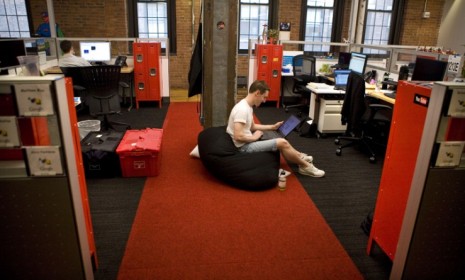Is the office cubicle dead?
Cost-cutting companies are tearing down cubicle walls to cram more workers into limited space — and even semi-privacy is becoming a nostalgic dream

A free daily email with the biggest news stories of the day – and the best features from TheWeek.com
You are now subscribed
Your newsletter sign-up was successful
The office cubicle might be one of the most potent symbols of modern atomization, segregating individuals inside vast honeycomb structures. But workers could come to miss those flimsy, chest-high partitions, as cost-cutting companies increasingly replace cubicles with communal areas that can accommodate more workers per square foot. Whether you call them "free address" floor plans or "nonterritorial offices," it's clear the open workspace is spreading beyond newsrooms and cool internet start-ups. Here, a guide:
Are open workspaces really on the rise?
Yes. About "70 percent" of workers now "inhabit open-plan offices," says Susan Cain at The New York Times. In these tough economic times, "average square feet per worker fell from 225 in 2010 to 176 in 2012," says Steve Yoder at The Fiscal Times. And the trend is only likely to accelerate: A whopping 97 percent of companies in 2011 said they "planned to implement one or more cost-saving measures relating to real estate," says Kelly Eggers at FINS Finance.
The Week
Escape your echo chamber. Get the facts behind the news, plus analysis from multiple perspectives.

Sign up for The Week's Free Newsletters
From our morning news briefing to a weekly Good News Newsletter, get the best of The Week delivered directly to your inbox.
From our morning news briefing to a weekly Good News Newsletter, get the best of The Week delivered directly to your inbox.
What other innovations are companies embracing?
In addition to communal set-ups, companies have introduced unassigned seating, in which workers share spaces and tables "with a sometimes shifting cast of colleagues," say Rachel Emma Silverman and Robin Sidel at The Wall Street Journal. Employees with unassigned seating receive "storage lockers to hold their files and supplies," and companies have also introduced "hotelling," in which workers can book unassigned seats in advance.
Do communal workspaces offer benefits beyond cost-cutting?
Companies think they do. Open areas are "encouraging workers to collaborate" and "reducing internal email," say Silverman and Sidel. The pace of decision-making at one company, the pharmaceutical giant GlaxoSmithKline, increased by 25 percent because "workers were able to meet informally instead of volleying emails from offices and cubes."
A free daily email with the biggest news stories of the day – and the best features from TheWeek.com
What do workers say?
The workers aren't as happy. A 2009 study shows that workers favor open-plan workspaces the least of available options. "Most workers just don't like the noise and loss of privacy when talking on the phone or to one another when barriers between desks are eliminated," says Eggers. Some companies have even implemented "pink noise," a "continuous stream" of low noise that is similar to white noise, and "is ideal for covering up the spectrum of human speech." Other workers say open spaces compel them to shut everything out with headphones, leaving them as alienated as they supposedly were in cubicles.
Are workers really more productive in open spaces?
Maybe not. Some say productivity is lost because "staff often go outside" just to make phone calls, says Yoder. Studies show that "people are more creative when they enjoy privacy and freedom from interruption," says Cain. While greater interaction can be a "useful way to exchange ideas," research also shows "that individuals almost always perform better than groups in quality and quantity." Furthermore, workers in open workspaces are more "hostile, insecure, and distracted," and are more "likely to suffer from high blood pressure, stress, the flu, and exhaustion."
So what's the solution?
Offices could mix it up. "Our offices should encourage casual, cafe-style interactions, but allow people to disappear into personalized, private spaces when they want to be alone," says Cain.
Sources: FINS Finance, The Fiscal Times, The New York Times, The Wall Street Journal
-
 6 of the world’s most accessible destinations
6 of the world’s most accessible destinationsThe Week Recommends Experience all of Berlin, Singapore and Sydney
-
 How the FCC’s ‘equal time’ rule works
How the FCC’s ‘equal time’ rule worksIn the Spotlight The law is at the heart of the Colbert-CBS conflict
-
 What is the endgame in the DHS shutdown?
What is the endgame in the DHS shutdown?Today’s Big Question Democrats want to rein in ICE’s immigration crackdown